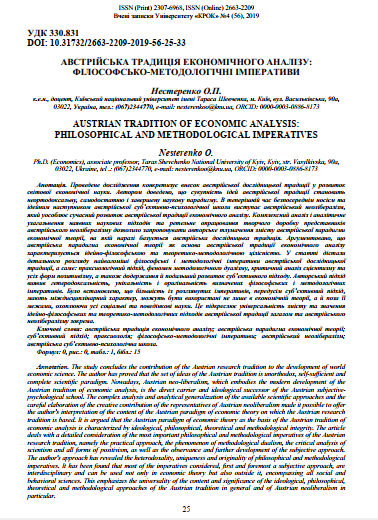AUSTRIAN TRADITION OF ECONOMIC ANALYSIS: PHILOSOPHICAL AND METHODOLOGICAL IMPERATIVES
DOI:
https://doi.org/10.31732/2663-2209-2019-56-25-33Keywords:
Austrian tradition of economic analysis, Austrian paradigm of economic theory, subjective approach, praxiology, philosophical and methodological imperatives, Austrian neoliberalism, Austrian subjective-psychological schoolAbstract
The study concludes the contribution of the Austrian research tradition to the development of world economic science. The author has proved that the set of ideas of the Austrian tradition is unorthodox, self-sufficient and complete scientific paradigm. Nowadays, Austrian neo-liberalism, which embodies the modern development of the Austrian tradition of economic analysis, is the direct carrier and ideological successor of the Austrian subjective-psychological school. The complex analysis and analytical generalization of the available scientific approaches and the careful elaboration of the creative contribution of the representatives of Austrian neoliberalism made it possible to offer the author's interpretation of the content of the Austrian paradigm of economic theory on which the Austrian research tradition is based. It is argued that the Austrian paradigm of economic theory as the basis of the Austrian tradition of economic analysis is characterized by ideological, philosophical, theoretical and methodological integrity. The article deals with a detailed consideration of the most important philosophical and methodological imperatives of the Austrian research tradition, namely the practical approach, the phenomenon of methodological dualism, the critical analysis of scientism and all forms of positivism, as well as the observance and further development of the subjective approach. The author's approach has revealed the heterodoxality, uniqueness and originality of philosophical and methodological imperatives. It has been found that most of the imperatives considered, first and foremost a subjective approach, are interdisciplinary and can be used not only in economic theory but also outside it, encompassing all social and behavioral sciences. This emphasizes the universality of the content and significance of the ideological, philosophical, theoretical and methodological approaches of the Austrian tradition in general and of Austrian neoliberalism in particular.
Downloads


